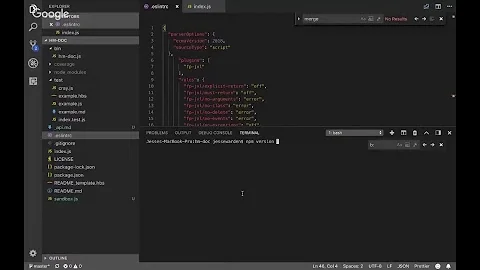glob exclude pattern
Solution 1
The pattern rules for glob are not regular expressions. Instead, they follow standard Unix path expansion rules. There are only a few special characters: two different wild-cards, and character ranges are supported [from pymotw: glob – Filename pattern matching].
So you can exclude some files with patterns.
For example to exclude manifests files (files starting with _) with glob, you can use:
files = glob.glob('files_path/[!_]*')
Solution 2
You can deduct sets:
set(glob("*")) - set(glob("eph*"))
Solution 3
You can't exclude patterns with the glob function, globs only allow for inclusion patterns. Globbing syntax is very limited (even a [!..] character class must match a character, so it is an inclusion pattern for every character that is not in the class).
You'll have to do your own filtering; a list comprehension usually works nicely here:
files = [fn for fn in glob('somepath/*.txt')
if not os.path.basename(fn).startswith('eph')]
Solution 4
Late to the game but you could alternatively just apply a python filter to the result of a glob:
files = glob.iglob('your_path_here')
files_i_care_about = filter(lambda x: not x.startswith("eph"), files)
or replacing the lambda with an appropriate regex search, etc...
EDIT: I just realized that if you're using full paths the startswith won't work, so you'd need a regex
In [10]: a
Out[10]: ['/some/path/foo', 'some/path/bar', 'some/path/eph_thing']
In [11]: filter(lambda x: not re.search('/eph', x), a)
Out[11]: ['/some/path/foo', 'some/path/bar']
Solution 5
Compared with glob, I recommend pathlib. Filtering one pattern is very simple.
from pathlib import Path
p = Path(YOUR_PATH)
filtered = [x for x in p.glob("**/*") if not x.name.startswith("eph")]
And if you want to filter a more complex pattern, you can define a function to do that, just like:
def not_in_pattern(x):
return (not x.name.startswith("eph")) and not x.name.startswith("epi")
filtered = [x for x in p.glob("**/*") if not_in_pattern(x)]
Using that code, you can filter all files that start with eph or start with epi.
Related videos on Youtube
Anastasios Andronidis
Updated on November 16, 2021Comments
-
 Anastasios Andronidis about 1 year
Anastasios Andronidis about 1 yearI have a directory with a bunch of files inside:
eee2314,asd3442... andeph.I want to exclude all files that start with
ephwith theglobfunction.How can I do it?
-
 Anastasios Andronidis almost 9 yearsReally interesting solution! But my case is going to be extremely slow to make a read twice. Also if the content of a folder is big on an network directory, is going to be slow again. But in any case, really handy.
Anastasios Andronidis almost 9 yearsReally interesting solution! But my case is going to be extremely slow to make a read twice. Also if the content of a folder is big on an network directory, is going to be slow again. But in any case, really handy. -
 Jaszczur over 8 years@TomBusby Try converting them to sets:
Jaszczur over 8 years@TomBusby Try converting them to sets:set(glob("*")) - set(glob("eph*"))(and notice * at the end of "eph*") -
 Eugene Pankov about 8 yearsUse
Eugene Pankov about 8 yearsUseiglobhere to avoid storing the full list in memory -
 Martijn Pieters about 8 years@Hardex: internally,
Martijn Pieters about 8 years@Hardex: internally,iglobproduces lists anyway; all you do is lazily evaluate the filter. It won't help to reduce the memory footprint. -
 Martijn Pieters about 8 years@Hardex: if you use a glob in the directory name then you'd have a point, then at most one
Martijn Pieters about 8 years@Hardex: if you use a glob in the directory name then you'd have a point, then at most oneos.listdir()result is kept in memory as you iterate. Butsomepath/*.txthas to read all filenames in one directory in memory, then reduce that list down to only those that match. -
 Eugene Pankov about 8 yearsyou're right, it's not that important, but in stock CPython,
Eugene Pankov about 8 yearsyou're right, it's not that important, but in stock CPython,glob.glob(x) = list(glob.iglob(x)). Not much of an overhead but still good to know. -
 Vitaly Zdanevich over 6 yearsThis must be at official documentation, please somebody add this to docs.python.org/3.5/library/glob.html#glob.glob
Vitaly Zdanevich over 6 yearsThis must be at official documentation, please somebody add this to docs.python.org/3.5/library/glob.html#glob.glob -
 Nathan Smith over 5 yearsJust as a side note, glob returns lists and not sets, but this kind of operation only works on sets, hence why neutrinus cast it. If you need it to remain a list, simply wrap the entire operation in a cast:
Nathan Smith over 5 yearsJust as a side note, glob returns lists and not sets, but this kind of operation only works on sets, hence why neutrinus cast it. If you need it to remain a list, simply wrap the entire operation in a cast:list(set(glob("*")) - set(glob("eph"))) -
 Ridhuvarshan about 4 yearsDoesn't this iterate twice?. Once through the files to get the list and the second through the list itself? If so, is it not possible to do it in one iteration?
Ridhuvarshan about 4 yearsDoesn't this iterate twice?. Once through the files to get the list and the second through the list itself? If so, is it not possible to do it in one iteration? -
 Martijn Pieters about 4 years@Ridhuvarshan: No, the list comprehension does just the one iteration. But if all you are going to do with the
Martijn Pieters about 4 years@Ridhuvarshan: No, the list comprehension does just the one iteration. But if all you are going to do with thefileslist is iterate, then you could just as well make it a generator expression. -
 Martijn Pieters almost 4 yearsNote that glob patterns can't directly fullfill the requirement set out by the OP: to exclude only files that start with
Martijn Pieters almost 4 yearsNote that glob patterns can't directly fullfill the requirement set out by the OP: to exclude only files that start withephbut can start with anything else.[!e][!p][!h]will filter out files that start witheeefor example. -
Felix Phl almost 3 yearsCorrect me if I am wrong, but shouldn't this be
glob.glob()? At least that's how I got it working. -
 Martijn Pieters almost 3 years@FelixPhl: depends on how you import it. If you use
Martijn Pieters almost 3 years@FelixPhl: depends on how you import it. If you usefrom glob import globthen the global nameglobin your module is the function. If you useimport globthen the global name is the module, and you need to useglob.glob(). -
 SpinUp __ A Davis almost 2 yearsNote if you're used to specifying your shell glob exclusions as
SpinUp __ A Davis almost 2 yearsNote if you're used to specifying your shell glob exclusions as[^_], this won't work in python's glob. Must use! -
 Wasi Master over 1 year@VitalyZdanevich it is in the documentation for fnmatch: docs.python.org/3/library/fnmatch.html#module-fnmatch
Wasi Master over 1 year@VitalyZdanevich it is in the documentation for fnmatch: docs.python.org/3/library/fnmatch.html#module-fnmatch




